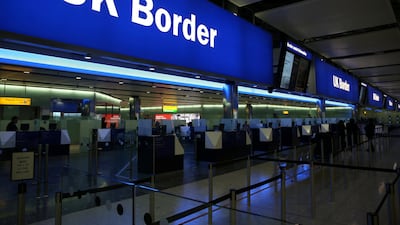Sometimes bigotry is blatant. Sometimes it is subtle. And sometimes it is the inevitable result of the system within which we operate. Recently I experienced this for myself when going through London's Heathrow airport – but I am deeply grateful for what I learned. It gave me yet another opportunity to understand how racism operates. And perhaps, just perhaps, it will give certain authorities in the UK a chance to address entrenched bias – if only in a small way.
As part of my work, I travel a great deal. I have been stopped and pulled aside on quite a few occasions by different authorities. I am of mixed race and I have a beard – that is usually enough for certain types of racial profiling. If the authorities have a chance to look at my British passport, it does not take them long to realise that I am indeed of mixed race and half Arab in ancestry. That clearly raises other red flags for them – even when they are loathe to admit it.
I have been stopped in countries within the wider Arab world region and in the West, but let me be clear: I am not one of those who suffers at airports or is usually treated badly, as many people are. I benefit immensely from enormous privileges in life. But I do sometimes get stopped – and it is usually when I am not in the UK. Hence when I did get stopped in Heathrow, I decided to take it very seriously indeed.
The officer was fair-skinned and as I looked around in the security stop area, I saw that no one who had been stopped was white. They were all people of colour. As the officer stopped me, I simply said: “What a surprise." That obviously riled him, because he insisted on knowing what I meant by that. So I told him: “I hardly find it surprising that you stop a man with a beard who looks non-white.”
The officer became rude and more aggressive, claiming that I had a chip on my shoulder. When I calmly responded that I did not and researched counter-terrorism for a living, he became more agitated. He said it was "very troubling" that I researched or taught this subject. As I responded to him with the word "mate", he became very annoyed, responding: "It’s not mate, it’s officer". I replied: “Okay, officer. It’s Dr Hellyer, by the way.”
I am not sure if that is what caused a change in his attitude. Or if it was looking at my passport. Or if the penny dropped that as a senior associate fellow at a London think tank, I work in Whitehall, next door to the Ministry of Defence. Or perhaps he realised he had been out of line and remembered that he was actually in the service of the public, rather than citizens such as myself being in his service. I have no idea. But he definitely changed his attitude and became more polite as he searched my bags.
The officer then tried to explain why he was so aggressive to begin with, saying that I had accused him of being racist, which he took offence to. And seeing as he had relaxed his attitude a bit, I decided to respond in kind.
“I'm not calling you racist personally," I said. "But let's imagine, just for argument's sake. I am not looking at you. I am looking at the system you operate within. And you have been polite, so let me say this: can you possibly entertain the possibility that there is some unconscious bias that led you to stop me, as opposed to someone you identified as white? Look around. No one else who has been stopped is white."
I have no idea why the officer decided to change his attitude. But I do know that he did. Was it class-related? Perhaps. In 1941, the author George Orwell wrote that Britain was “the most class-ridden society under the sun”.
A friend of mine put it well when he said: "Implicit bias is something we need to examine and discuss openly if we are going to make any progress at all in just about any field – racial or otherwise."
It is delicate – and people are quick to assume you are calling them racist by forcing them to confront the uncomfortable reality of their own biases. If they cannot admit that they have biases informed by race – even if they are not racist – they are not part of the solution.
In the aftermath of this, Heathrow airport contacted me – if only to say that responsibility for the incident lay with Border Force, an agency that comes under the UK's Home Office. On its part, Border Force got in touch with me not long afterwards, saying that they were investigating and would get back to me within 20 days. They assured me that my complaint was being taken seriously and that a full response would be sent to me once the investigation was complete. All of this was after I had tweeted about the experience in a thread that went viral.
There were some who argued I should simply accept an apology and leave it at that. But such behaviour is not about me personally, nor that officer specifically. It is about a system that exists and the scores of nameless people who are subjected to abuse because of it. Where we do have privilege, we ought to use it for the purpose of holding power to account, because we can. Others do not have that choice. And unless we take the opportunity to do so, others will continue to be abused. I hope that Border Force and others realise the importance of addressing that.
Dr HA Hellyer is a senior associate fellow at the Royal United Services Institute and the Carnegie Endowment for International Peace

